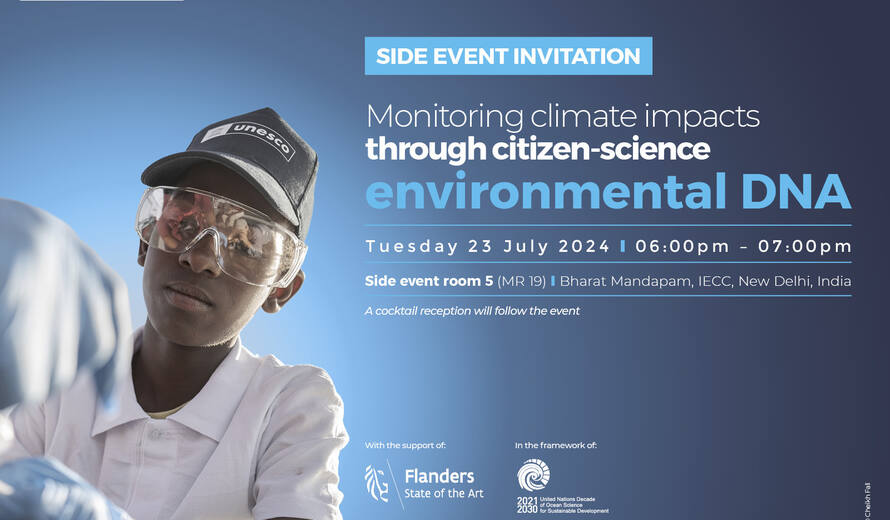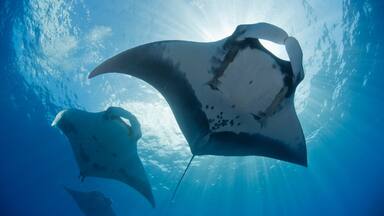46 COM Side Event: Monitoring Climate Impacts through Citizen Science Environmental DNA
UNESCO marine World Heritage sites are vital refuges for global biodiversity, hosting about 35% of threatened marine species. However, over 70% of the 50 marine sites inscribed on the UNESCO World Heritage List are currently threatened by climate change, according to the 2020 IUCN World Heritage Outlook. The UNESCO Environmental DNA (eDNA) Expeditions, a global citizen science initiative, aims to measure marine biodiversity and assess the impact of climate change on species distribution across these sites.
From April 2022 to November 2023, UNESCO involved over 250 young students in collecting eDNA samples at 21 marine World Heritage sites across 17 countries, including Sudan, Yemen, Australia, Argentina, Brazil, Seychelles, Bangladesh, Mauritania, and South Africa. These sites were chosen to represent diverse marine environments.
The results will provide a snapshot of biodiversity, focusing on fish and mega vertebrates, many of which are on the IUCN Red List of vulnerable and endangered species. By analysing this data alongside ocean warming projections, scientists will better understand climate change's impact on exceptional marine biodiversity.
Understanding the impact of climate change on species behaviour is essential for effective conservation and decision-making. This knowledge helps identify shifting patterns in biodiversity and guides strategies such as seasonal closures, no-take zones, or adjustments to site boundaries and buffer zones. The UNESCO eDNA Expeditions initiative will offer important insights for world-wide management of marine protected area, as UNESCO marine World Heritage sites act as indicators of changes affecting marine ecosystems globally.
eDNA is an innovative scientific method that can be used to monitor and evaluate ocean biodiversity without the need to extract organisms from their environment. Just one litre of water may contain genetic material from hundreds of species and may help determine the area’s biodiversity richness.
A side event focussed on this initiative will take place, in the framework of the 46th session of the World Heritage Committee, on Tuesday, July 23, 2024, from 6 pm to 7 pm local time in Room 5 (M19) of the Bharat Mandapam, IECC, New Delhi, India.
Programme
Opening remarks
Mr Ernesto Ottone R., Assistant Director-General for Culture of UNESCO
The impact of climate change on the future of marine World Heritage
Ms Katherine Zischka, World Heritage Conservation Officer, International Union for the Conservation of Nature (IUCN)
Environmental DNA in the Wadden Sea
Dr Soledad Luna, World Heritage Focal Point, Common Wadden Sea Secretariat, Denmark, Germany and the Netherlands (Kingdom of the)
Science & Innovation in World Heritage Conservation in the African region
Mr Ebaye Sidina, Deputy Director, Banc d’Arguin National Park, Mauritania
Engaging youth in eDNA sampling in Socotra Archipelao, Yemen
H.E. Mohammed Jumeh, Ambassador and Permanent Delegate of the Republic of Yemen to UNESCO
The importance of citizen-science in World Heritage conservation
Mr Dries Desloover, Focal Point Natural World Heritage, Government of Flanders (Kingdom of Belgium)
Closing remarks (video message)
Ms Aurélie Duchateau, Deputy General Representative, Embassy of Belgium, Delegation of Flanders (Kingdom of Belgium)
UNESCO eDNA Expeditions is a collaboration between the Intergovernmental Oceanographic Commission and the World Heritage Centre, supported by the Government of Flanders (Kingdom of Belgium) and implemented in the context of the UN Decade of Ocean Science for Sustainable Development.
For more information, visit the UNESCO eDNA Expeditions webpage.



